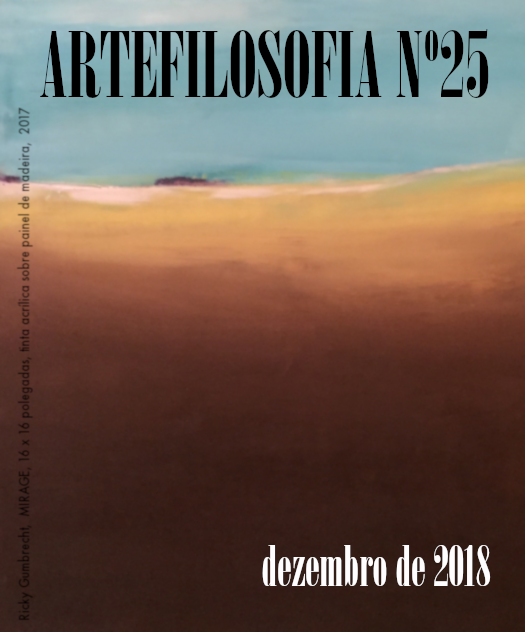Explosions of Sepp
Resumo
Trata-se de recuperar a subterrânea influência de Marx na produção teórica que se movimenta a partir do colóquio “Materialidades da Comunicação”. Argumenta-se que o colóquio “Materialidades da Comunicação”, na tentativa de revisitar o conceito marxiano de materialismo, produziu uma versão “de-marxializada” da materialidade como alternativa (e reação) aos excessos de uma cultura pós-moderna da interpretação. No entanto, a de-marxialização do conceito significou, em última instância, esvaziá-lo de sua crítica política, fazendo dele uma ferramenta politicamente inócua. Sugere-se, por fim, que reconectar o conceito de materialidade à sua origem crítica abre toda uma gama de possíveis investigações.
Downloads
Referências
AGAMBEN, Giorgio. What is an apparatus and other essays. Translated by David Kishik and Stefan Pedatella. Stanford, California: Stanford University. Press, 2009.
BUCK-MORSS, Susan. “Aesthetic and Anaesthetic: Walter Benjamin’s Artwork Essay Reconsidered”. October, Vol. 62 (Autumn, 1992), pp. 3-41, The MIT Press.
FLUSSER, Vilém. Gestures. Translated by Ann Roth. Minneapolis, London: University of Minnesota Press, 2014. FOUCAULT, Michel. “The Order of Discourse”. In: YOUNG, Robert. Untying the Text: A Post-Strucutralist Reader. London and Boston: Routledge & Kegan Paul., 1981.
GUMBRECHT, Hans Ulrich. After 1945: Latency as Origin of the Present. Stanford, California: Stanford University Press, 2013.
GUMBRECHT, Hans Ulrich. Atmosphere, Mood, Stimmung: on a hidden potential of literature. Translated by Erik Butler. Stanford, California: Stanford University Press, 2012.
GUMBRECHT, Hans Ulrich. Our Broad Present: time and contemporary culture. New York; Chichester, West Sussex: Columbia University Press, 2014.
GUMBRECHT, Hans Ulrich. Production of Presence: what meaning cannot convey. Stanford, California: Stanford University Press, 2004.
HARTOG, François. Régimes d’historicité: présentisme et expériences du temps. Paris: Éditions du Seuil, 2003. HEGEL, G.W.F. Aesthetics: Lectures on Fine Art. Translated by T.M.Knox. Vol. 1. Oxford: Oxford University Press, 1975.
HEGEL, G.W.F.Aesthetics: Lectures on Fine Art.Translated by T.M.Knox.Vol. 1. Oxford: Oxford University Press, 1975.
JAMESON, Fredric Postmodernism, or, the cultural logic of late capitalism.London and New York: Verso, 1991.
JUDT, Tony; SNYDER, Timothy. Thinking the twentieth century. New York: The Penguin Press, 2012.
KANT, Immanuel. Kritik der Urteilskraft. In: WEISCHEDEL, Wilhelm (Org.): Immanuel Kant,Werkausgabe, Band 10. Frankfurt am Main: Suhrkamp, 1974.
KITTLER, Friedrich. Gramophone, Film, Typewriter.Translated, with an Introduction, by Geoffrey Winthrop - Young and Michael Wutz. Stanford, California: Stanford University Press, 1999.
MARX, Karl. Capital: A Critique of Political Economy. Vol. 1.Introduced by Ernest Mandel. Translated by Ben Fowkes. London: Penguin Books, 1976.
MARX, Karl; ENGELS, Friedrich. Economic and Philosophic Manuscripts of 1844 and the Communist Manifesto. Translated by Martin Milligan. New York: Prometheus Books, 1988.
MARX, Karl. Grundrisse: Foundations of the Critique of Political Economy. Translated with a Foreword by Martin Nicolaus. London: Penguin Books, 1993.
MCLUHAN, Marshall. Understanding Media: the extensions of man. Cambridge, Massachusetts; London, England: MIT Press, 1994.
WINTHROP-YOUNG, Geoffrey; WUTZ, Michael. “Translator’s Introduction: Friedrich Kittler and Media Discourse Analysis”. In: KITTLER, Friedrich. Gramophone, Film, Typewriter.Translated, with an Introduction,by Geoffrey Winthrop-Young and Michael Wutz. Stanford, California: Stanford University Press, 1999.
Copyright (c) 2019 Artefilosofia

This work is licensed under a Creative Commons Attribution-NonCommercial-ShareAlike 4.0 International License.
Autores que publicam nesta revista concordam com os seguintes termos:
- Autores/as mantém os direitos autorais e concedem à revista o direito de primeira publicação, com o trabalho simultaneamente licenciado sob a creativecommons.org/licenses/by-nc-sa/4.0/ que permite o compartilhamento do trabalho, com reconhecimento da autoria e publicação inicial nesta revista.
- Autores/as têm autorização para assumir contratos adicionais separadamente, para distribuição não-exclusiva da versão do trabalho publicada nesta revista (ex.: publicar em repositório institucional ou como capítulo de livro), com reconhecimento de autoria e publicação inicial nesta revista.


